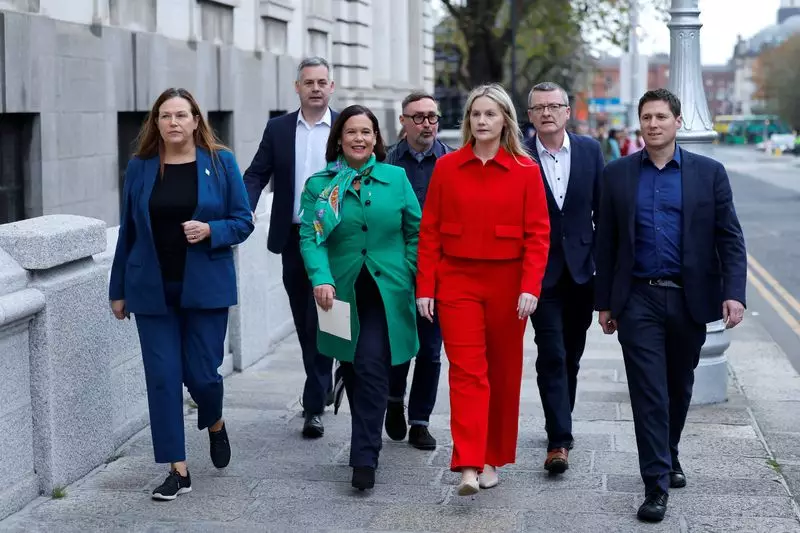In the lead-up to the upcoming Irish election, the political landscape has shifted dramatically for Sinn Féin, a party that previously appeared poised to ascend to power for the first time in Dublin. Once viewed as the front-runner in a changing political climate, recent polls suggest that Sinn Féin’s once-promising position has deteriorated into that of an also-ran. This dramatic decline could significantly impede the momentum towards the party’s goal of national reunification, a mission that has gained traction amid ongoing debates about identity and governance in Ireland.
Sinn Féin, historically associated with Irish nationalism, had been mobilizing support with a vision of not only leading the government but also implementing key structural plans aimed at acquiring a united Ireland. This ambition, however, now hangs in the balance as the party grapples with internal dissent and external perceptions. The discontent among traditional working-class constituents toward Sinn Féin’s approach to immigration reflects a broader fracturing within its electoral coalition, potentially thwarting their aspirations at this critical juncture.
As Sinn Féin canvassed for support in its working-class strongholds, issues like housing affordability and underfunded public services took precedence over discussions of Irish unity. The party’s struggle to rally a broad-based coalition signals a challenging road ahead. Young voters, such as 30-year-old teacher Deirdre Ní Chloscaí, show little urgency in pushing for reunification, prioritizing immediate concerns over the long-term vision. The absence of unity discourse in local campaigns may indicate a waning interest in the reunification agenda, at least in comparison to more pressing daily struggles faced by voters.
Furthermore, the lack of engagement on the topic of Irish unity by Sinn Féin’s rivals highlights a stark reality: while the concept remains a vital part of the historical narrative, it is not currently urgent for many in the electorate. Even Prime Minister Simon Harris’s party, Fine Gael, encapsulates this trend by allotting scant attention to Northern Ireland in its lengthy manifesto, expressing more interest in gradual integration through economic investment rather than political union.
Despite the troubling signs for Sinn Féin, public sentiment towards Irish unity remains intriguing. Opinion polls continue to indicate that a considerable number of voters in the Republic of Ireland support the idea of ending British rule in Northern Ireland. Interestingly, while Northern Ireland remains divided on its status, the outcome of Brexit has rekindled discussions surrounding reunification, particularly among populations that had previously been less politically engaged.
There is also an observable demographic shift occurring within Northern Ireland. Recent census data shows that Catholics—who tend to favor Irish nationalism and reunification—now outnumber Protestants for the first time. Such shifts could create an environment more conducive to discussions on unification as younger generations come to the forefront of the political landscape, although these discussions still require substantive political backing to transition from debate to reality.
Future Directions and the Role of Parties
Sinn Féin leader Mary Lou McDonald insists that the roadmap toward reunification will remain a priority, regardless of the electoral results. The conviction that the reunification dialogue transcends individual political dominance suggests a need for collaborative coalition-building, not just among political parties but also civil society. Achieving a united Ireland will necessitate a broad spectrum of support—one that is not solely dependent on Sinn Féin’s potential leadership.
Colin Harvey, a university professor and advocate for the unity debate, echoes this sentiment. He emphasizes the importance of a multifaceted approach that engages a variety of stakeholders to navigate the complexities of national identity and governance. If Sinn Féin can pivot from a narrow focus on its party’s fortunes to a broader coalition for unity, there could yet be a path forward for achieving long-standing aspirations for a united Ireland.
As the electoral season presses on, Sinn Féin faces formidable challenges that could redefine its role in the Irish political landscape, potentially impacting the trajectory toward reunification for years to come. However, the underlying public sentiment favoring unity, coupled with changing demographics, suggests that the dialogue will persist. Ultimately, the pursuit of an integrated Ireland will hinge less on any single party and more on the collective will of its people, calling for renewed collaboration and inclusive discourse as the country navigates its future.

